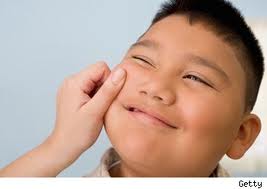I had to hire a babysitter to I could go pee, so Dylan (son #2) could survive until his first birthday. Tristan had claws like lobsters and every time, just walking, Dylan would toddle over to big brother Tristan to steal one of his lined-up plastic animals, Tristan would pinch his cheeks. Dylan became our star therapist always interrupting Tristan’s autistic trance, but the downside was that Dylan had continual bloody cheeks for about two years.
One morning I plopped Dylan up on the counter to apply his daily dose of antibacterial cream to his cheeks and it occurred to me that we needed to change course and I was enabling Tristan to behave poorly because I pitied him. At four years old, Tristan blabbed like a six month old; when he wanted a cracker he would stand at the cabinet until I got him a snack. We were working on, “cracker, please” and if I said it, Tristan would repeat.
After the first few months that Tristan was diagnosed with autism I let all the “professionals” take over the responsibility of raising my child. They had their P.H.D.s in speech therapy, physical therapy, childhood development, and occupational therapy and in my sleep deprived mind they were the best choice to parent Tristan.
Like Sleep Beauty being woken with a kiss, I was shaken out of my stupor with words from a good friend and established parent of five who also just so happens to be a developmental pediatrician, “Angela, you know that some of Tristan behaviors are typical, right?” I shot back a glance and said, “What do you mean?” He went on to explain that kids are first kids (the autism was second) and that they need structure and discipline.
This concept of Tristan having typical behaviors that all toddlers and preschoolers flirt with like hitting, pinching, biting, and tantrums at first made me angry (OH, so now I have to not only deal with the autistic characteristics, but I have to also parent his typical behaviors!) and at the same time relieved for having Tristan have a part of him that was like all his peers.
Over the next few months we (our team including me) made structure and consequences for good and bad actions a continual plan we were all working on. If Tristan hit another child, he had a time-out (see blog post for tips for time-outs), but for every negative interaction we balance it with five positive interactions. You can easy slide into (and I still do) correcting or disciplining and not recognizing when your child doesn’t hit or pinch or says, “Mama, cracker, please?” The balance is the key to growing your child into a responsible older child that understands boundaries and respects others.
Finally, the last piece is consistency and practice. Tristan needed more time to practice how to sit on the step for a time out. We began with many visual cues and a limited amount of time (again, really you should read this blog post). Then we all practiced praising when Tristan deserved being rewarded (don’t give out positive praise too quickly). The whole process still continues and we are still practicing but not at the “boot camp” level; now it is integrated into our everyday life.





